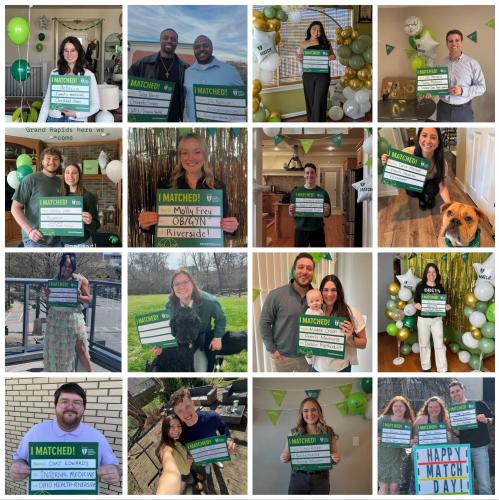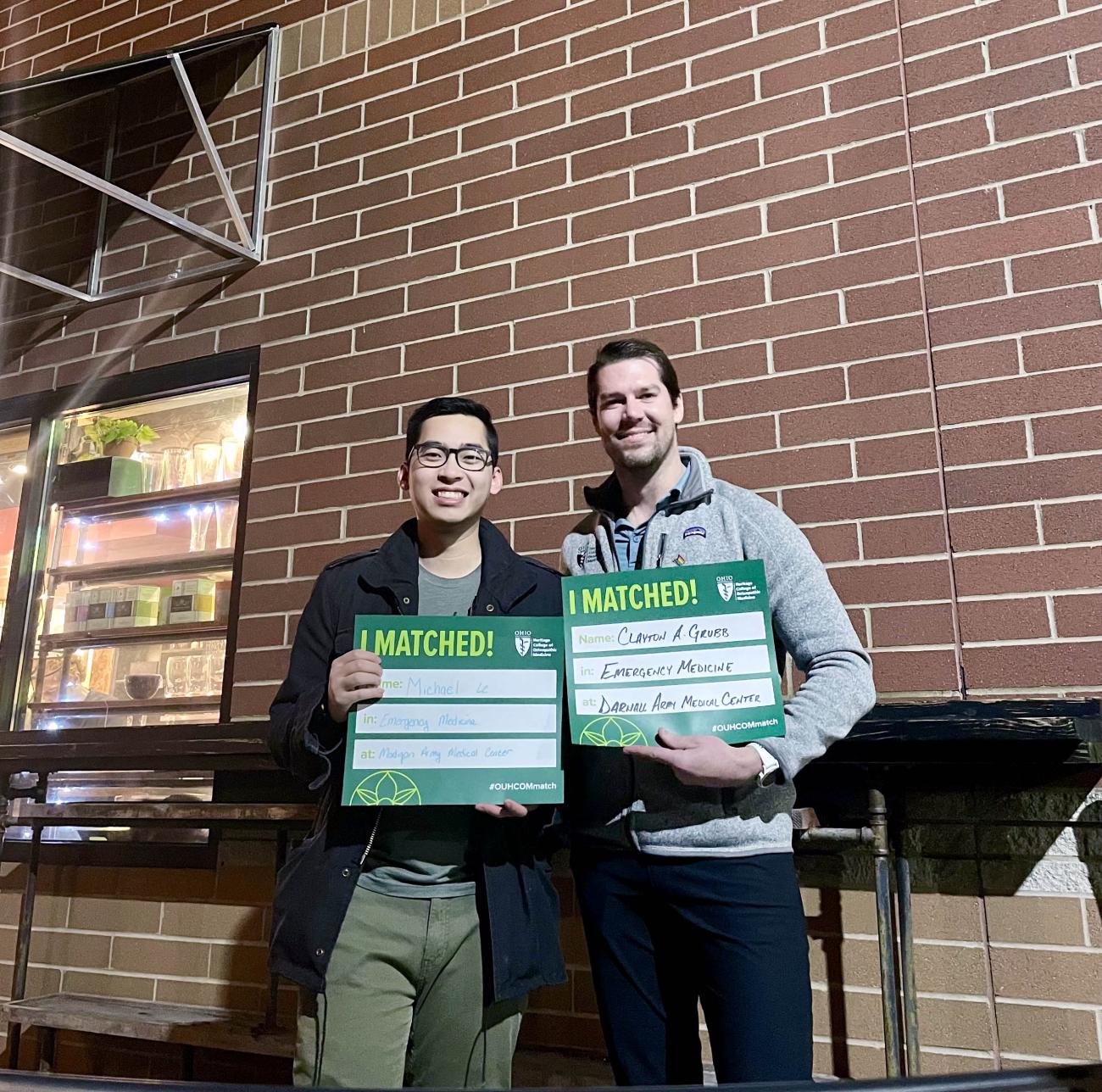
Heritage College of Osteopathic Medicine graduates' match results reveal the next step in their journey

The third Friday in March is one of the most highly anticipated and dreaded days for students graduating from medical school. It’s the day most of them learn where they will be doing their residency. However, students matching through the military or going into neurology, neurosurgery, urology or ophthalmology residency programs receive the news about their match months earlier.
Ohio University Heritage College of Osteopathic Medicine student Nick Ferrara, who was raised in Miamisburg, Ohio, learned about his match after months of aggressively pursuing a residency program that was the first of its kind in the U.S. Air Force.
Heritage College student Michael Le, the son of Vietnamese immigrants, says he was on a clinical rotation helping a patient when the call, announcing where he would be spending the next several years of his life, came through.
“I was able to tell my patients, and they were super excited,” said Le, a second lieutenant with the U.S. Army. He will be doing his residency at the Madigan Army Medical Center on Joint Base Lewis-McChord outside Tacoma, Washington.
Perseverance pays off
Nick Ferrara didn’t begin college thinking he would be a physician. He comes from a family of engineers and was following in their footsteps by pursuing an engineering degree at the University of Cincinnati when he landed a summer job working in a hospital kitchen.
It was in the hospital, seeing the work of health care teams that he found his calling. His parents, though, were skeptical. Because he’d struggled with engineering, they were concerned he’d face similar difficulties in medicine, Ferrara said.
“My argument to them was I don’t like [engineering],” he said. “The medicine tract I enjoyed, so I didn’t see how it would be so hard.”
When it came time to apply to medical school, the Heritage College stood out. Ferrara liked that the college had strong ties to the community and offered clinical rotation sites throughout Ohio.
It wasn’t until his father was diagnosed with cancer that he found the specialty he wanted to pursue. Between the disease and chemo treatments, his father struggled to swallow, but a physical medicine and rehabilitation specialist (PM&R) helped him restore his functional ability and quality of life, giving Ferrara a first glimpse of this specialized field of medicine. Then, Ferrara did a clinical rotation with a PM&R physician.
“He opened my eyes,” said Ferrara. “I like how it is a well-defined specialty but there are so many things you can do – so much versatility. I won’t get bored.”
Feeling the need to serve his country and seeing the investment that the military made in health research, Ferrara decided he wanted to practice medicine in the U.S. Air Force.
“I thought it would be a fantastic place to train,” he said.
However, the Air Force did not have a PM&R residency. So, he scheduled rotations in orthopedics and neurology, thinking he’d have to abandon the idea of doing PM&R. In his third year of medical school, he learned the Air Force was considering starting a PM&R residency program, their first ever. He quickly reached out to the director.
“I said, I want that spot. What do we have to do to make this work,” said Ferrara. He lobbied and persisted until the call came letting him know he would be the first resident in the Air Force’s brand-new PM&R residency at the University of Texas Health Science Center at San Antonio.
Ferrara said his parents are proud.
“They are most proud of the perseverance to get what I wanted,” said Ferrara. “That’s what they’re most proud of – that value that they gave to me.”

A full circle moment
Michael Le’s route to medical school seemed predestined. He was raised in Bedford, Ohio, just a short drive from the Heritage College’s Cleveland campus.
“OU has always been in the backyard waiting for me to grow up and go in those doors,” Le said.
Since he was a child, he had a strong interest in medicine and that interest was amplified during a trip to Vietnam, the country from which his parents had emigrated. Seeing the difference between the United States and Vietnam and how people were cared for, inspired him to become a physician so he could make a tangible difference in the lives of people.
Le also wanted to join the Army. His grandfathers had served in the military in Vietnam, and Le said he wanted to uphold the tradition. He debated enlisting right out of high school, but his acceptance into John Carroll University and the Heritage College’s Early Assurance Program convinced him to delay his enlistment. The Early Assurance Program gives eligible high school seniors a direct path to medical school following their graduation from a partnering university.
Later, Le learned about the Army’s Health Professions Scholarship Program, which provides tuition and a stipend for medical students who enlist. He signed up because he could serve in the military and attend medical school at the same time.
“I couldn’t be more happy,” Le said. “It’s the perfect blend of me pursuing my medical career while serving the country that welcomed my family with open arms.”
While attending John Carroll, Le volunteered in local emergency rooms. He had an inkling that emergency medicine would ultimately be his preferred specialty. Still, he kept an open mind and during clinical rotations found that he liked everything he tried. Then his emergency medicine rotation sealed the deal.
“I got to dip my toes in all those other fields and interact with colleagues everywhere,” Le said. He enjoyed the fast pace, that he could touch on so many parts of medicine and help people. “If felt like a natural fit.”
Through the Army, he also did several trainings at medical programs around the country, which he said made ranking the programs for residency difficult.
As part of the residency matching process, students interview with programs. This is the case for both early matches and for graduating medical students who are part of the main residency matching process, which the National Resident Matching Program administers. Applicants and residency programs rank each other, and an algorithm is used to match applicants to programs. For those who don’t match early, the process culminates with a nationwide reveal on Match Day, the third Friday in March.
Being in the Army, Le learned his match much earlier than most medical students but still describes it as “kind of cool but terrifying at the same time.”
The call announcing his match came in the middle of a clinical rotation. When he checked the number and saw that it was from Tacoma, he knew he was headed to Washington.
“I knew I wasn’t going to be in Ohio and that was a bummer, but I was pretty excited when the phone call came in,” said Le. His parents were thrilled. Tacoma is a short drive from Seattle, which is where they’d first arrived in the United States.
“It was a full circle moment,” said Le.
It’s a match
Eighteen Heritage College students, half of them military, matched early. The remaining graduates in the Heritage College Class of 2025 found out on March 21, where they would be headed for residency. The preliminary numbers show that 99% of the class matched with 51% of students matching in primary care and 65% matching to residencies in Ohio.
As they think about their career and future, both Le and Ferrara would like to pay forward the help and mentorship they received which made it possible for them to achieve their dreams.
“In medical school I found a true passion for teaching,” Le said, adding he would eventually like to work in a setting, either in the military or as a civilian, where he can teach others. He is also interested in pursuing a palliative care fellowship and being a clerkship director.
Ferrara said he also hopes to teach but isn’t sure what that looks like yet.
“No doctors would exist if people weren’t willing to teach them what to do,” he said. “I know that teaching and giving back in the health care community is something I see for the rest of my life.”
Ferrara looks at his journey and wants other medical students to remember that persevering is key.
“Things change. Your interests change. But the one thing you should never do is give up,” said Ferrara. “Try as hard as you can, as best as you can, but never sell yourself short.”
Le said he’s been telling his friends and classmates not to worry, because “everything works out how it should, even if it’s not the way they expected, they’ll have an amazing story to tell at the end of the journey.”
Disclaimer: It is not the intent of Ohio University to imply an endorsement by any service branch of the U.S. Armed Forces.
